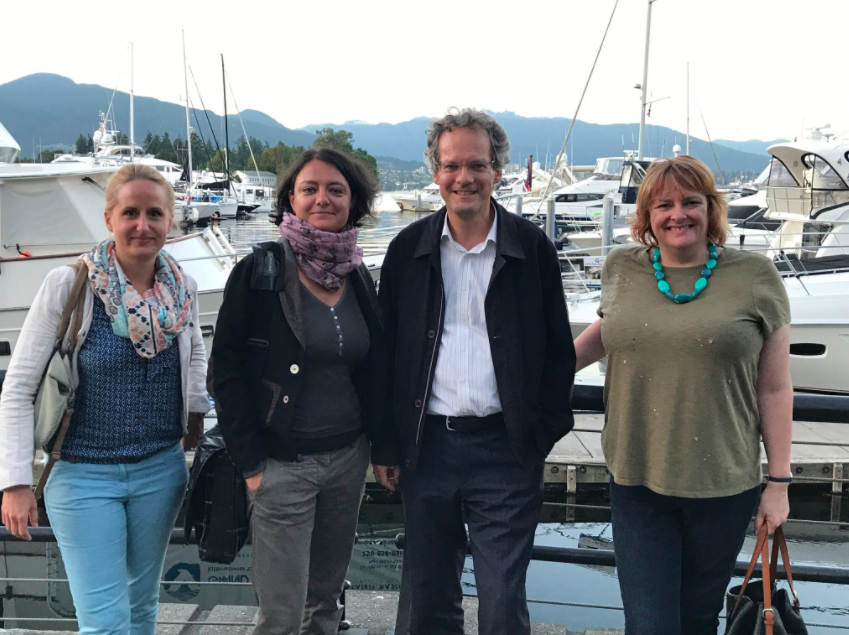Age/ing Waves
Ageing Waves is an ongoing feminist micro historiography that attends to the specialist players of the ondes Martenot – an electronic musical instrument that made its public premiere in 1928 at the Paris Opera.
Ageing Waves is an ongoing feminist micro historiography that attends to the specialist players of the ondes Martenot – an electronic musical instrument that made its public premiere in 1928 at the Paris Opera.
ACT researcher Shannon Hebblethwaite was recently featured in a piece in the Montreal Gazette titled “New research from Concordia examines how we can age well while living healthier, longer“. Hebbelthwaite, who is a professor of applied human sciences at Concordia University and the director of the recently-formed engAGE centre for research on aging, discusses her recent research on intergenerationality, and her ACT-funded work on online communication between grandmothers and grandchildren.
The Centre for Women, Ageing and Media (WAM) celebrated its ten year anniversary at its sixth international summer school in June this year. This took place in Gloucestershire in England. WAM2017 took ‘Noisy Women’ as its theme and the summer school lived up to the promise.
Kelly Leonard, a Research Assistant who has been working with ACT for two years, will soon defend her MA thesis titled “Exploring Community Inclusion in Older Adulthood through the use of Computers and Tablets” on August 21 at Concordia University. Her project was supervised by ACT co-applicant Shannon Hebblethwaite.
Exploring Community Inclusion in Older Adulthood through the use of Computers and Tablets
August 21, 2017, 10am
Concordia University, Loyola Campus
VE 317
7141 Sherbrooke Street West
While the manifestation of technostress is common across age, gender and cultural contexts, older adults have very specific challenges. Older adults, despite being the fastest growing segment of ICT users, are often ignored in technostress research, thus very little is known about how they experience and cope with it.

Pictured: ACT members Barbara Ratzenböck, Francesca Comunello, Eugène Loos and Wendy Martin in Vancouver, Canada.
Eugène Loos launched the Intergenerational Gaming Platform at the Human Computer Interaction conference held in July in Vancouver, Canada. He also organized three panels: New media in the life of older people, Digital gaming among older populations, Intergenerational use of new media. The panels were presented as part of the stream on Human Aspects of IT for the Aged Population, and involved various ACT researchers, including Francesca Comunello, Benjamin Lille, Mireia Fernández-Ardèvol, Wendy Martin, Simone Mulargia, Barbara Ratzenböck, Margarida Romero, Andrea Rosales and Eugène Loos.

Eugène Loos, Professor at the University of Amsterdam, Senior Lecturer Utrecht University and ACT co-applicant, presents “Exergaming: Meaningful Play for Older Adults?”

Francesca Comunello, ACT researcher, presents “My grandpa and I ‘gotta catch ‘em all.’ A research design on intergenerational gaming focusing on Pokémon Go”

Benjamin Lille, graduate student at Université de Laval and ACT graduate student, presents “Intergenerational Techno-Creative Activities in a Library Fablab”

Barbara Ratzenböck, PhD student at the University of Graz and ACT graduate student, presents “Everyday Life Interactions of Women 60+ with ICTs: Creations of Meaning and Negotiations of Identity”

Wendy Martin, Lecturer at Brunel University and ACT co-applicant, presents “Visual Representations of Digital Connectivity in Everyday Life”
By Eva-Maria Trinkaus
The Graz International Summer School Seggau (GUSEGG) 2017 has started on July 2nd and through the long-standing cooperation with ACT, this year’s summer school is again host to one ACT module that focuses on aging in the framework of technologies. Line Grenier, who taught the first week of the module, has handed over to David Madden who will teach the second week, focusing on ageing and music, and ageing and material culture. This year, the module hosts 13 students from 12 different universities and 9 disciplines, and focuses on the “’art of aging in its intersections with the proliferation of computer-mediated communications and networked societies,” as described by the seminar professors.
In the lecture of the first week, Line Grenier shared her perspectives on aging and “The working force of concepts: critical reflections on ‘memory’ and its travels.” Grenier emphasized further emphasized the in-class topic of the seminar, and focused on the importance of memory in her lecture, addressing aspects such as memory loss, regaining memory through neuroscientific methods, and the nature of memory as a process that travels through space and time. David Madden will continue to delve into concepts related to age studies in week two, and also provide focus on the production of audio-based media capsules.
On June 9, 2017, the members of community organization and ACT partner Respecting Elders: Communities against Abuse (RECAA), along with Le Groupe Herencias and Encounters Project, organized a public walk comprised of moving art installations in downtown Montreal.
This event was organized to mark World Elder Abuse Awareness Day, which takes place on June 15 2017.
Tricia Toso met with Shannon Hebblethwaite to discuss her most recent research and to learn a little more about the complexities of family communications, in particular the challenges grandparents experience.
